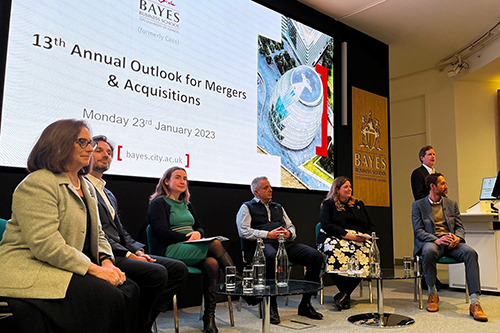By Chris Mahony (Senior Communications Officer), Published
The UK remains the most attractive destination in Europe for inbound and domestic mergers and acquisitions (M&A) investment, according to an annual index published by Bayes Business School (formerly Cass) today.
Globally, the UK leap-frogged Canada last year to move up one place – to third – out of the 148 nations analysed by the Mergers and Acquisitions Research Centre (MARC) at Bayes, City, University of London.
The United States tops the global list, followed by Singapore and the UK – with Canada, Germany, France, South Korea, The Netherlands, Norway and Australia completing the top ten.
The index assesses countries against 19 indicators grouped in six categories, ranging from Regulatory and Political and Infrastructure (such as road and rail) to access to financing and demographics.
Commenting on the UK’s continued strong showing in the index, co-author Dr Naaguesh Appadu, Research Fellow at Bayes, said: “With three prime ministers in 2022 and high inflation coming on top of Brexit, the pandemic and the Russian invasion of Ukraine, the M&A environment in the UK appears to be remarkably robust. We are publishing an analysis of M&A activity in the UK during this period of uncertainty this week and it suggests that investors see uncertainty as the ‘new normal’.
“When the UK finally left the EU in January 2020 the country’s M&A landscape did change. After record-breaking activity in 2021 due to Covid, the market cooled in 2022 and fell further last year. The UK M&A market remains fragile but the pound’s depreciation against other major currencies and the decline of the share price of UK-based companies boosted inbound M&A activity.”
The MARC M&A Attractiveness Index Score (MAAIS) was first published in 2009. It records both annual movements up and down the league table and movements over five years.
Headlines from the latest index include:
- While Germany and France both remain in the top ten, since 2018 Germany has slipped two places while France rose one place.
- China, in 14th position, fell two places last year and is down three places on 2018.
- India has risen nine places to 40th since 2018, despite falling five places last year.
- Russia, perhaps unsurprisingly, fell 18 places last year to 55th.
- Other big movers inside the top 50 last year include Cyprus (up 11 to 42nd) and Denmark, Latvia, Oman and Kazakhstan – all of which rose ten places.
- The big gainers over the five year period included Saudi Arabia (up 14 places to 44th), the Philippines (up 13 to 47th), Oman (up ten places to 49th) and Thailand (up 12 to 29th).
The report also analyses what the indicators tell governments, firms and investors about the challenges and opportunities facing each nation. In recent years, for example, environmental, social and governance (ESG) considerations have become increasingly important for investors considering a deal, as has the presence of strong national infrastructure.
Impact of Covid and geopolitical shocks reshaping markets
Dr Appadu said: “As the global economy continues to recover from a series of massive shocks, the nature of both the opportunities and challenges facing different countries face varies widely. This year, the biggest market challenge for nine of the countries in the top ten are socio-economic factors linked both to an ageing population, unemployment and the lingering impact of Covid on labour markets.
“By contrast, the nature of the main market opportunities and strengths in the top ten is more diverse: in six it is the strong infrastructure and assets, with two benefitting from strong ESG and two from their political and regulatory environment.”



